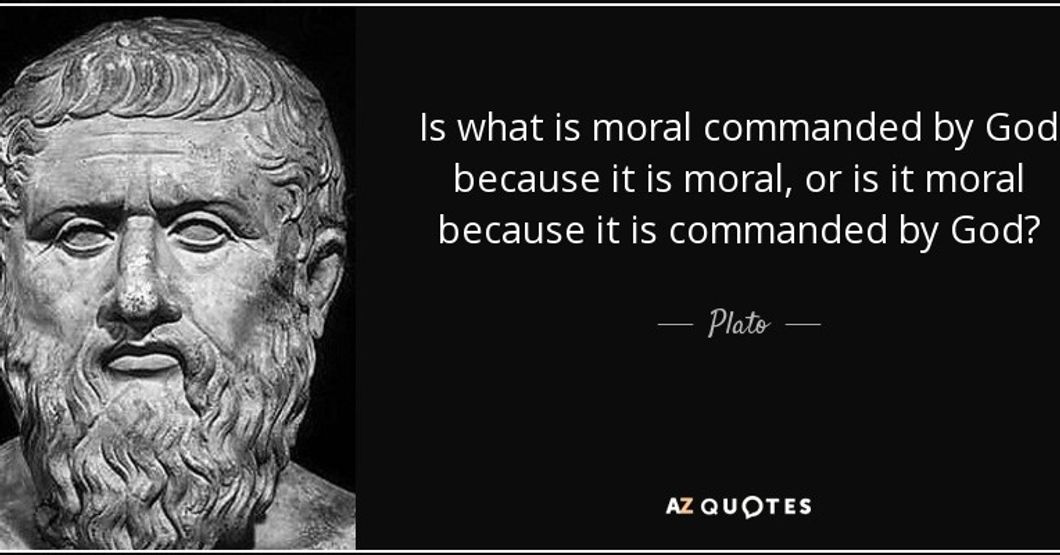Last week I briefly talked about different ways some might attempt to answer the question of whether we can know if God exists or not. Today I will give two broadly atheistic answers to the question of whether and how God is connected to morality and next week I will give two broadly theistic answers. As I have already noted before, these do not exhaust the options. The question of how God is connected to morality is a very old question as we will see with one of the atheistic answers.
Before I get into the meat and potatoes however, there are some terms to define and clarify. Let's first take atheism. Atheism is the view that there is no God. There are many folks out there who define atheism as simply lacking a belief in God as opposed to the way I just defined it. You might wonder why we should proceed with my definition instead of theirs. Unfortunately I cannot adequately defend my definition in this post because it would take too long. That will require an entire new piece altogether. For now, I will assume my understanding of atheism is correct.
Secondly I need to clarify what I mean by "morality." I do not mean simply moral rules or rules for conduct. I am talking about things like goodness, badness, obligations, virtues, and so on. When I say that I have a certain system of morality, I mean that I have a view about what those above terms are and how they fit together in the human life. That is roughly what I mean by morality. With that being said, let's get started on the question "Is God connected to morality?"
There is no God and morality is an evolutionary fiction.
This is an atheistic position about God and an anti-realist view of morality. To be an anti-realist about something is basically to deny that it exists or that it can be known or detected. Realism is obviously the opposite view. So basically, to say that morality is a fiction is the same as being an anti-realist about it as well. How would this work exactly?
There are a few ways to spell this out and I do not claim to have completely adequately represented this view, especially with avoiding to going into too many details. First, some ethicists (philosophers who specialize in ethics or moral theory) have said that the evolutionary process of our origins have undermined the basis for our thinking that our beliefs about right and wrong are factually concerned. That is, what we believe about right and wrong are not factually rooted in anything about the world but come from somewhere else. They could come from our feelings, learned behaviors or perhaps just instincts.
So, in a nutshell, God did not create us with an innate capacity to make moral judgments (judgments have factual/logical content) because He is not real and morality emerged from the evolutionary process which was not ultimately concerned with truth but with the right behaviors geared towards survival.
So when we say that slavery was wrong, bestiality is bad, abortion is wrong, gassing Jews during the Holocaust was evil, we are – according to this view – just expressing our feelings about the matter. It is almost like seeing something disgusting and shouting "Yuck!" It is merely an emotional reaction as opposed to an assertion about something in the world.
There is no God, morality is universally real, but God cannot be the basis for morality.
This view basically maintains the atheistic position about God. Claims – contrary to the evolutionary skeptic – that morality is real and further adds that God cannot be the basis for morality. There are a few things to flesh out here. First, the atheist here is saying that statements like "kindness is a virtue," "torturing children for fun is always wrong" and "selfishness is a vice" are all making factual claims as claims about our planet, solar system, plants, animals, and so on. Those claims cannot be true for some people but not for others. If they are true, they are always true regardless of what anyone might think or believe. Furthermore, we can know they are true.
Now what about the last part? God is supposedly not able to be the basis for morality. Why would this be true? Probably because it goes back to an age-old question posed a few thousand years ago by the famous philosopher Socrates: Is something good/right because God wills it? Or does God will it because it is good/right? This has been called the Euthyphro Dilemma.
Let's pause for a minute. One thing I forgot to mention is the issue of stability or necessity. What kind of world would we live in if we woke up tomorrow and everything or most of what we believe about right and wrong were flipped the other way around? What if torturing children for fun was actually good? What about rape? What if it was wrong to be just, and good to be unjust and cruel? If morality is to be real in a very robust way, some things about the moral order we inhabit have to be the same no matter the circumstances. Otherwise, we would have moral chaos.
Going back to the dilemma, the concern is whether right and wrong are just the spin offs of what God commands or whether God does not determine what right and wrong are. If you take the first option, then right and wrong just become whatever God commands. And God can command whatever He wants, right? Who are we to say what He can or cannot command?
On the other hand, if you take the last option, God almost becomes unnecessary. If some moral truths can never be false, then not even God could make them false. But if that is true, then why is God even needed to explain morality in reality?
So, what do you think? Would you say that morality is a fiction or that it is just as real as what science tells us about the physical world?






 Christmas and New Year gift card
Photo by
Christmas and New Year gift card
Photo by  butter cookies on plate
Photo by
butter cookies on plate
Photo by  boy holding Holy
boy holding Holy 











